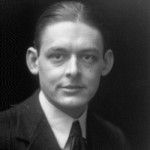Humankind cannot stand very much reality.
T. S. Eliot Quotes
Sweet Thames, run softly till I end my song, Sweet Thames, run softly, for I speak not loud or long. But at my back in a cold blast I hear The rattle of the bones, and chuckle spread from ear to ear.
Similar Quotes
Cricket is the greatest game that the wit of man has yet devised.
- Sir Pelham WarnerAdvertising is selling Twinkies to adults.
- Donald R. VanceThe struggle of the male to learn to listen to and respect his own intuitive, inner prompt...
- Herb GoldbergEach generation of the church in each setting has the responsibility of communicating the ...
- Francis SchaefferEach had defended his own country; the Germans Germany, the Frenchmen France; they had don...
- Ernst TollerComments on: "T. S. Eliot Quotes: Sweet Thames, run softly till I end my song, Sweet Thames, run softly,..."

| Birth: | 26th September, 1888 |
| Death: | 4th January, 1965 |
| Nationality: | American, British |
| Profession: | Critic, Dramatist, Editor, Playwriter, Poet, Publisher |
Eliot was born into the Eliot family, a middle class family originally from New England, who had moved to St. Louis, Missouri. From 1898 to 1905, Eliot attended Smith Academy, where his studies included Latin, Ancient Greek, French, and German. He began to write poetry when he was fourteen under the influence of Edward Fitzgerald's Rubaiyat of Omar Khayyam, a translation of the poetry of Omar Khayyam. He said the results were gloomy and despairing, and he destroyed them. His first poem published, "A Fable For Feasters," was written as a school exercise and was published in the Smith Academy Record in February 1905. Also published there in April 1905 was his oldest surviving poem in manuscript, an untitled lyric, later revised and reprinted as "Song" in The Harvard Advocate, Harvard University's student magazine. He also published three short stories in 1905, "Birds of Prey," "A Tale of a Whale" and "The Man Who Was King." The last mentioned story significantly reflects his exploration of Igorot Village while visiting the 1904 World's Fair of St. Louis.
After graduation, Eliot attended Milton Academy in Massachusetts for a preparatory year, where he met Scofield Thayer, who would later publish The Waste Land. He studied philosophy at Harvard from 1906 to 1909, earning his bachelor's degree after three years, instead of the usual four. Frank Kermode writes that the most important moment of Eliot's undergraduate career was in 1908, when he discovered Arthur Symons's The Symbolist Movement in Literature (1899). After working as a philosophy assistant at Harvard from 1909 to 1910, Eliot moved to Paris, where from 1910 to 1911, he studied philosophy at the Sorbonne. He attended lectures by Henri Bergson and read poetry with Alain-Fournier. From 1911 to 1914, he was back at Harvard studying Indian philosophy and Sanskrit. Eliot was awarded a scholarship to Merton College, Oxford in 1914. He first visited Marburg, Germany, where he planned to take a summer program, but when the First World War broke out, he went to Oxford instead.
Eliot died of emphysema in London on January 4, 1965. For many years he had had health problems caused by his heavy smoking, and had often been laid low with bronchitis or tachycardia.
Related Authors
Advertisement
Today's Anniversary - 24th December
Births
- 1958 - Alex Lowe
- 1944 - Mike Curb
- 1932 - Cynthia Payne
- 1922 - Ava Gardner
- 1809 - Kit Carson
Deaths
- 1934 - Alban Berg
- 1863 - William Makepeace Thackeray
- 1959 - William Cameron Forbes
- 1881 - Leonard Bacon
- 1999 - Bill Bowerman
Quote of the day
Popular Topics
About Quoteswave
Our mission is to motivate, boost self confiedence and inspire people to Love life, live life and surf life with words.


Share with your friends